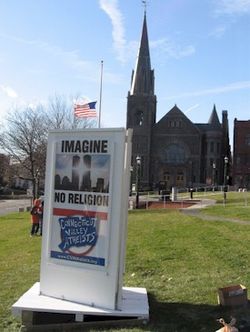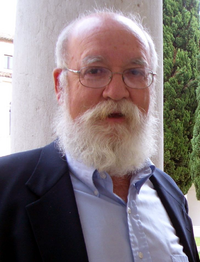Criticism of religion
|
Part of a series on |
|
Demographics · Religion · History Agnostic atheism · Agnostic theism Irreligion
Secular Humanism · Post-theism Metaphysical · Religious · Humanistic People
Atheists · Agnostics · Humanists Books
The God Delusion Organizations
Atheist Alliance International
Freedom From Religion Foundation |
|---|
|
Portal WikiProject ·
|
Criticism of religion is criticism of the concepts, validity, and/or practices of religion, including associated political and social implications.[1]
Religious criticism has a long history, going back as far as the first century BCE in Rome with Titus Lucretius Carus's De Rerum Natura, and continuing to the present day with the advent of New Atheism, represented by such authors as Sam Harris, Daniel Dennett, Richard Dawkins, Victor J. Stenger, and Christopher Hitchens.
Critics consider religion to be outdated, to be harmful to the individual (e.g. brainwashing of children, faith healing, circumcision), to be harmful to society (e.g. holy wars, terrorism, wasteful distribution of resources), to impede the progress of science, and to encourage immoral acts (e.g. blood sacrifice, discrimination against homosexuals and women).
Some critics of religion, including Dennett, Harris, and Hitchens, assert that theist religions and their holy books are not divinely inspired, but instead are fabrications of non-divine human individuals, created to fulfill social, biological, and political needs.[2][3][4] Dawkins balances the benefits of religious beliefs (mental solace, community-building, promotion of virtuous behavior) against the drawbacks.[5]
History

The first century BCE Roman poet, Titus Lucretius Carus, in his magnum opus De Rerum Natura, wrote: "But 'tis that same religion oftener far / Hath bred the foul impieties of men:"[7]
A philosopher of the Epicurean school, Lucretius believed the world was composed solely of matter and void, and that all phenomena could be understood as resulting from purely natural causes. Lucretius, like Epicurus, felt that religion was born of fear and ignorance, and that understanding the natural world would free people of its shackles.[8]
Niccolò Machiavelli, at the beginning of the sixteenth century said: "We Italians are irreligious and corrupt above others... because the church and her representatives have set us the worst example."[9] To Machiavelli, religion was merely a tool, useful for a ruler wishing to manipulate public opinion.[10]
Writing in 1776 of the ancient Romans, Edward Gibbon said: "The various modes of worship which prevailed in the Roman world were all considered by the people as equally true; by the philosopher as equally false; and by the magistrate as equally useful."[11]
Deism became prominent in the 17th and 18th centuries during the Age of Enlightenment, especially in the United Kingdom, France, and the United States, mostly among those raised as Christians who found they could not believe in either the doctrine of the Trinity, the divinity of Jesus, miracles, or the inerrancy of scriptures, but who did believe in one god. Initially it did not form any congregations, but in time deism strongly influenced other religious groups, such as Unitarianism and Universalism, which developed from it. It continues to this day in the form of classical deism and modern deism.
Interest in and controversy over criticism of religion has increased in the 21st century due to the spread of so-called New Atheism.
Many critics of religion see significant difficulties in religious concepts, which they consider to contradict modern scientific and cultural values and to have a negative impact on current social and ethical issues.

Criticism of religious concepts
A major criticism of many religions is that they require beliefs that are irrational, un-scientific, or unreasonable. Stated differently, religious beliefs and traditions lack scientific or rational foundations. There are several aspects to this criticism, including:
- Religions often posit facts that are contradicted by scientific evidence (e.g. evolution, origin of the universe, miracles), for example, the claim that prayer has a beneficial effect on others has been tested and disproved.[12]
- Religions often require behaviors that are not sensible (such as the Old Testament prohibition against wearing garments of mixed fabrics, or punishing children of guilty parents).[13]
- Religions and their holy books contain rules and laws designed to govern behavior and conduct, some of which—within a single religion—are contradictory or impossible to follow.
- Religions and their holy books often contain conflicting facts or histories (for example, discrepancies between the four Gospels of the New Testament).
- Religions have been claimed to contain elements not distinguishable from fairy tales or superstitions (such as astrology or Santa Claus).
- Religions cannot adapt to a changing world and their teachings are outdated in comparison with modern Western morals, such as the rules on certain diets, such as not eating pork or shellfish which did make sense some thousand years ago, when those animals often where infested with parasites, are illogical nowadays as the quality in food safety has increase tremendously.
Religions have promoted facts and histories that are contradicted by science. These often form the basis of significant controversies, such as the trial of Galileo for his purported heresy that the earth moves around the sun. The origin of the human species, as presented by many Christian sects, is contradicted by the scientific theory of evolution by natural selection. The origin of the earth or universe is often described by holy books in the form of creation myths, which are contradicted by scientific theories of cosmology. In other cases, religions assert the factual existence of phenomena such as miracles and angels, which are not necessarily contradicted by science, but find little or no scientific support.
Religious adherents, such as the notable Christian apologist C.S. Lewis, counter these arguments by suggesting that all religions, by definition, involve faith, or a belief in concepts that cannot be proven or disproven by science. However, some religious beliefs have been disproven by science, for instance Young Earth creationism.[14] Scientist Stephen Jay Gould agreed with C.S. Lewis and suggested that religion and science were non-overlapping magisteria.[15] Scientist Richard Dawkins has said that religious practitioners often do not believe in the view of non-overlapping magisteria (NOMA).[12] Dawkins argues that any time a religious person claims that a certain event (e.g. the Love Parade stampede[16]) is a punishment by God or that they have been helped or rewarded by God for their actions ("thank god") the NOMA thesis is violated. For NOMA to hold, Dawkins argues the supernatural being in question must not have any effect on people's physical lives, and that only claims regarding the afterlife are allowed.
Conflicting claims of "one true faith"
Some critics of religion, such as Stephen F. Roberts, discuss the multiplicity of religions that claim to be the one true faith, such as Roman Catholicism, Mormonism, or Evangelical Christianity. Critics point out that if two or more religions claim to be the only valid faith, then logic dictates that the claims of all but one of those religions must be wrong. Atheist Stephen Roberts illustrates this principle as follows:
| “ | I contend that we are both atheists. I just believe in one fewer god than you do. When you understand why you dismiss all the other possible gods, you will understand why I dismiss yours. | ” |
|
— Stephen F. Roberts,[17] quoted in Like Rolling Uphill
|
Survey research from the US indicates that many people change their religious affiliation over time. Those with no religious affiliation are the fastest growing group. However, this group has a relatively low retention rate (46%) when compared to other groups. Such data suggest that significant numbers of people do not believe consistently that a single faith is uniquely true.[18]
Lack of permanence
Some critics, such as Opsopaus and Hitchens, cite what they describe as obsolete religions—religions that no longer have active adherents—as evidence that religions are not everlasting, as the religions claim.[19] Some obsolete religions discussed by critics include Greek mythology, Millerism, Roman mythology, Sabbatai Sevi, and Norse mythology.[20] The short work "The Syrian Goddess" by the ancient author Lucian of Samosata provides many examples of once thriving religions that had gone out of existence.[21] However, some supposedly obsolete religions, such as polytheistic reconstructionism, and Hellenic, Roman, and Nordic neopaganism, have seen renewed practice in recent decades.
Explanations as non-divine in origin
Social construct
Many criticisms hinge on the proposition that religion is a social construct and thus just another human ideology. Under this view, the origins of religion lie in human beings and human societies, not in the intervention of some divine being or cosmic truth. Accordingly, the historicity of religious accounts is called into question.
Narratives to provide comfort and meaning

With certain exceptions, such as Raëlism, Mormonism, Scientology, and the Bahá'í Faith, most religions were formulated at a time when the origin of life, the workings of the body, and the nature of the stars and planets were poorly understood.[22] Religious systems attempted to address significant personal emotional issues, and tried to explain a frightening existence, usually through a dramatic narrative outlining how the world and their community came to be.
These narratives were intended to give solace and a sense of relationship with larger forces. As such, they may have served several important functions in ancient societies. Examples include the views many religions traditionally had towards solar and lunar eclipses, and the appearance of comets (e.g. astrology).[23][24] Given current understanding in such fields as biology, psychology, chemistry, and physics, where human knowledge has increased dramatically, many critics — including Sam Harris, Richard Dawkins, Christopher Hitchens, and Michel Onfray — contend that continuing to hold on to these idea systems is absurd and irrational.[25][26][27]
Stanford computer scientist John McCarthy states, "We also have no need for [the hypothesis of God], because science has been successful, and science is the best approach to solving the mysteries that remain."[28] Apologists for religion such as William Lane Craig, however, claim that there are reasonable arguments supporting the existence of God.[29]
Opium of the people

| “ | Religious suffering is, at the same time, the expression of real suffering and a protest against real suffering. Religion is the sigh of the oppressed creature, the heart of a heartless world, and the soul of soulless conditions. It is the opium of the people. | ” |
According to Karl Marx, religion is a tool utilized by the ruling classes whereby the masses can shortly relieve their suffering via the act of experiencing religious emotions. It is in the interest of the ruling classes to instill in the masses the religious conviction that their current suffering will lead to eventual happiness. Therefore as long as the public believes in religion, they will not attempt to make any genuine effort to understand and overcome the real source of their suffering, which in Marx's opinion was their capitalist economic system.[30]
In this perspective, Marx saw religion as escapism:[30]
The abolition of religion as the illusory happiness of the people is the demand for their real happiness. To call on them to give up their illusions about their condition is to call on them to give up a condition that requires illusions. The criticism of religion is, therefore, in embryo, the criticism of that vale of tears of which religion is the halo.
Marx also viewed the Christian doctrine of original sin as being deeply anti-social in character. Original sin, he argued, convinces people that the source of their misery lies in the inherent and unchangeable "sinfulness" of humanity rather than in the forms of social organization and institutions, which, Marx argued, can be changed through the application of collective social planning.[31]
Viruses of the mind

In his 1976 book The Selfish Gene, Richard Dawkins coined the term memes to describe informational units that can be transmitted culturally, analogous to genes.[32] He later used this concept in the essay "Viruses of the Mind" to explain the persistence of religious ideas in human culture.[33]
Dawkins argues that religious ideologies are a set of ideas and concepts working together to ensure the perpetuation and proliferation of the religion itself. For instance, important concepts in Christianity are raising one's children to be Christians, following The Great Commission and its monotheistic nature. These are proposed to work together to protect the religion from competition from other memes. In this context, religion is criticized for being maladaptive in that it can cause the carrier of that meme to act irrationally, misallocate resources and feel guilt, fear or other negative emotions without real reason.
Religion apologist John Bowker criticized the idea that "God" and "Faith" are viruses of the mind, suggesting that Dawkins' "account of religious motivation ... is ... far removed from evidence and data" and that, even if the God-meme approach were valid, "it does not give rise to one set of consequences ... Out of the many behaviours it produces, why are we required to isolate only those that might be regarded as diseased?"[34] Alister McGrath has responded by arguing that "memes have no place in serious scientific reflection",[35] that there is strong evidence that such ideas are not spread by random processes, but by deliberate intentional actions,[36] that "evolution" of ideas is more Lamarckian than Darwinian,[37] and that there is no evidence (and certainly none in the essay) that epidemiological models usefully explain the spread of religious ideas.[38] McGrath also cites a metareview of 100 studies and argues that "[i]f religion is reported as having a positive effect on human well-being by 79% of recent studies in the field, how can it conceivably be regarded as analogous to a virus?"[39]
Mental illness or delusion
Critics such as author Richard Dawkins says that religious belief often involves delusional behavior.[40] American author Sam Harris, author of The End of Faith and Letter to a Christian Nation compares religion to mental illness, saying it "allows otherwise normal human beings to reap the fruits of madness and consider them holy."[41]
There are also psychological studies into the phenomenon of mysticism, and the links between disturbing aspects of certain mystic's experiences and their links to childhood abuse.[42][43][44] In another line of research, Clifford A. Pickover explores evidence suggesting that temporal lobe epilepsy may be linked to a variety of spiritual or ‘other worldly’ experiences, such as spiritual possession, originating from altered electrical activity in the brain.[45] Carl Sagan, in his last book The Demon-Haunted World: Science as a Candle in the Dark, presented his case for the miraculous sightings of religious figures in the past and the modern sightings of UFOs coming from the same mental disorder. According to Professor Vilayanur S. Ramachandran, "It's possible that many great religious leaders had temporal lobe seizures and this predisposes them to having visions, having mystical experiences."[46] Dr. Michael Persinger stimulated the temporal lobes of the brain artificially with a magnetic field using a device nicknamed the "God helmet," and was able to artificially induce religious experiences along with near-death experiences and ghost sightings.[47] Neuropsychology Professor John Bradshaw also says:
Some forms of temporal lobe tumours or epilepsy are associated with extreme religiosity. Recent brain imaging of devotees engaging in prayer or transcendental meditation has more precisely identified activation in such sites — God-spots, as Vilayanur Ramachandran calls them. Psilocybin from mushrooms contacts the serotonergic system, with terminals in these and other brain regions, generating a sense of cosmic unity, transcendental meaning and religious ecstasy. Certain physical rituals can generate both these feelings and corresponding serotonergic activity.[48]
Religion apologist Keith Ward in his book Is Religion Dangerous? addresses the claim that religious belief is a "delusion." He quotes the definition in the Oxford Companion to Mind as "a fixed, idiosyncratic belief, unusual in the culture to which the person belongs," and notes that "[n]ot all false opinions are delusions." Ward then characterizes a delusion as a "clearly false opinion, especially as a symptom of a mental illness," an "irrational belief" that is "so obviously false that all reasonable people would see it as mistaken." He then says that belief in God is different, since "[m]ost great philosophers have believed in God, and they are rational people". He argues that "[a]ll that is needed to refute the claim that religious belief is a delusion is one clear example of someone who exhibits a high degree of rational ability, who functions well in the ordinary affairs of life ... and who can produce a reasonable and coherent defense of their beliefs" and claims that there are many such people, "including some of the most able philosophers and scientists in the world today."[49]
Evolved characteristic of the human brain
Some critics, such as Richard Dawkins and Pascal Boyer, contend that religion is nothing more than a social construct that primitive humans evolved to improve their odds of survival. Dawkins and others have posited that a pre-disposition to believe in superstitions and religion could enhance the survival of the human species, by enhancing fear of imagined (and sometimes real) dangers, and thus increasing the likelihood that humans would take pre-emptive defensive measures.
Research in 2009 on the so -called "God Spot" has found that several areas of the brain are involved in religious belief, one within the frontal lobes of the cortex—which are distinctively developed in humans—and another in the more evolutionary-ancient regions deeper inside the brain, which humans share with apes and other primates. The study found that people of different religious persuasions and beliefs, as well as atheists, all tended to use the same circuits in the brain to solve a perceived moral conundrum which were also the same ones used when religiously-inclined people dealt with issues related to God. The findings support the idea that the brain has evolved to be sensitive to any form of belief that improves the chances of survival and suggests the brain is inherently sensitive to believing in almost anything if there are grounds for doing so. This work was followed by a study where scientists tried to stimulate the temporal lobes with a rotating magnetic field. Michael Persinger, from Laurentian University in Ontario, found that he could artificially create the experience of religious feelings in 80% of volunteers.[50]

Immature stage of societal development
Some critics of religion say that religion is merely an early phase during the development of a culture or society, and that religion is often replaced with more rational or reasonable belief systems. Many critics assert that the needs of religion can be met with alternative, superior means, namely: the need for explaining life and death can be met by science and philosophy; questions of good and evil are addressed by ethics; and inspiration and beauty can be found in the arts.[51]

Daniel Dennett, author of Breaking the Spell, said "I expect to live to see the evaporation of the powerful mystique of religion. I think that in about twenty-five years almost all religions will have evolved into very different phenomena, so much so that in most quarters religion will no longer command the awe it does today."[52]
Geoffrey Miller,[53] in the November 2006 edition of New Scientist said: "Evolutionary moral psychology will reveal the social conditions under which human moral virtues flourish. The US will follow the UK in realizing that religion is not a prerequisite for ordinary human decency. Thus, science will kill religion — not by reason challenging faith, but by offering a more practical, universal and rewarding moral framework for human interaction. A naturalistic moral philosophy will replace the rotting fictions of theological ethics."[54] Dr. John Bradshaw, Professor of Neuropsychology at Monash University Melbourne wrote: "Evolutional models are every bit as beautiful and intellectually and morally satisfying as the myths, stories and precepts of an ossified theology — and they can explain, predict and be applied in hosts of important and socially useful ways."[55]
Philosopher Auguste Comte posited that many societal constructs pass through three stages, and that religion corresponds to the two earlier, or more primitive stages.
| “ | From the study of the development of human intelligence, in all directions, and through all times, the discovery arises of a great fundamental law, to which it is necessarily subject, and which has a solid foundation of proof, both in the facts of our organization and in our historical experience. The law is this: that each of our leading conceptions -- each branch of our knowledge -- passes successively through three different theoretical conditions: the theological, or fictitious; the metaphysical, or abstract; and the scientific, or positive. | ” |
Harm to individuals
Many aspects of religion are criticized by skeptics on the basis that they are harmful to the individual believer, citing such things as dogmatic adherence to irrational beliefs and practices (e.g. snake handling, cult suicide, walking on water), unnecessary restrictions on natural human behavior (e.g. teetotalism, sexual prohibitions) and the subsequent mental and emotional trauma of fear and guilt.
Child abuse

Critics such as Christopher Hitchens and Richard Dawkins use the term "child abuse" to describe the harm that some religious upbringings inflict on children.[56][57] They claim that children are especially vulnerable to mental harms related to religion, including:
- Terrorized by threats of punishment, such as eternal damnation in a fiery hell
- Extreme guilt about normal, healthy sexual functions
- Trained to disrespect science and reason
- Indoctrinated into a particular religious faith, thus depriving the child of the opportunity to make their own free inquiry later, when they are mature
Dawkins is angered by the term "Muslim child" or a "Catholic child". He asks how a young child can possibly be considered intellectually mature enough to have such independent views on the cosmos and humanity’s place within it. By contrast, Dawkins points out, no reasonable person would speak of a "Marxist child" or a "Tory child."[56]
Pessimist philosopher Arthur Schopenhauer spoke of the subject in 19th century:
And as the capacity for believing is strongest in childhood, special care is taken to make sure of this tender age. This has much more to do with the doctrines of belief taking root than threats and reports of miracles. If, in early childhood, certain fundamental views and doctrines are paraded with unusual solemnity, and an air of the greatest earnestness never before visible in anything else; if, at the same time, the possibility of a doubt about them be completely passed over, or touched upon only to indicate that doubt is the first step to eternal perdition, the resulting impression will be so deep that, as a rule, that is, in almost every case, doubt about them will be almost as impossible as doubt about one's own existence.—Arthur Schopenhauer, On Religion: A Dialogue
Child brides
Some religions, such as Islam[58] and Mormonism,[59] have promoted marriage of older men to girls as young as 10 years of age. The Seyaj Organization for the Protection of Children describes cases of a 10 year old girl being married and raped in Yemen (Nujood Ali),[60] a 13 year old Yemeni girl dying of internal bleeding three days after marriage,[61][62] and a 12 year old girl dying in childbirth after marriage.[58][63] Mormon founder Joseph Smith married girls as young as 13 and 14,[59] and other early Mormon church members married girls as young as 10.[64] The LDS branch of the Mormon faith has eliminated underaged marriages in the past century, but fundamentalist branches of Mormonism continue the practice.
Inadequate medical care
Some religions treat illness, both mental and physical, in a manner that does not heal, and in some cases exacerbates the problem. Specific examples include faith healing of certain Christian sects, the Christian Science religion which eschews medical care, and exorcisms.[65][66]
Faith based practices for healing purposes have come into direct conflict with both the medical profession and the law when victims of these practices are harmed, or in the most extreme cases, killed by these "cures."[67][68][69] A detailed study in 1998 found 140 instances of deaths of children due to religion-based medical neglect. Most of these cases involved religious parents relying on prayer to cure the child's disease, and withholding medical care.[70]
Jerusalem syndrome
There are certain places with deep associations with religious feeling, often called places of pilgrimage. One of these is Jerusalem, which is revered by followers of Judaism, Christianity and Islam. Jerusalem has lent its name to a unique psychological phenomenon where Jewish or Christian individuals who develop obsessive religious themed ideas or delusions (sometimes believing themselves to be Jesus Christ or another prophet) will feel compelled to travel to Jerusalem.[71][72]
During a period of 13 years (1980–1993) for which admissions to the Kfar Shaul Mental Health Centre in Jerusalem were analysed, it was reported[73] that 1,200 tourists with severe, Jerusalem-themed mental problems were referred to this clinic. Of these, 470 were admitted to hospital. On average, 100 such tourists have been seen annually, 40 of them requiring admission to hospital. About 2 million tourists visit Jerusalem each year. Kalian and Witztum note that as a proportion of the total numbers of tourists visiting the city, this is not significantly different from any other city.[74][75] The statements of these claims has however been disputed, with the arguments that experiencers of the Jerusalem syndrome already were mentally ill.[74][76]
Guilt about normal sexual functions
Critics such as Hitchens assert that many religions view some types of sexual activity (such as homosexuality or masturbation) as evil or immoral, and that this view can sometimes leads to neuroses or other ill effects.[77]
.jpg)
Blood sacrifice
Hitchens claims that many religions endorse blood sacrifice, wherein innocent victims are killed or harmed to appease deities,[78] specifically citing Judaism for its obsession with blood and sacrifice, particularly the goal of identifying and sacrificing of a pure red heifer (described in Numbers 19), the pursuit of which Hitchens characterizes as "absurd", singling out the goal of raising a human child in a "bubble" so as to "be privileged to cut that heifer's throat".[79] Another prominent example is the daily sacrifice of humans practiced by the Aztecs.[80][81]
Genital modification and mutilation
Hitchens claims that many religions endorse male circumcision and female genital cutting, which he views as genital mutilation, and as immoral, unhealthy, and unnecessary.[82]
Mental health versus mysticism and self-sacrifice
Nathaniel Branden, psychotherapist and writer, best known today for his work in the psychology of self-esteem, and student and one-time romantic partner of novelist Ayn Rand, writes in his essay "Mental Health versus Mysticism and Self-Sacrifice" about the harm religion causes to individuals. He adduces that the maintenance of his life and the achievement of self-esteem require of man the fullest exercise of his reason but he asserts that morality, men are taught, rests on and requires faith. Faith, he asserts, is the commitment of one’s consciousness to beliefs for which one has no sensory evidence or rational proof. When a man rejects reason as his standard of judgment, only one alternative standard remains to him: his feelings. A mystic is a man who treats his feelings as tools of cognition. Faith is the equation of feeling with knowledge. He concludes by claiming that if sacrifice is a virtue, it is not the neurotic but the rational man who must be "cured".[83]
Counterarguments
Responding in the book The Irrational Atheist to criticisms that religion is harmful, Theodore Beale argues that religious individuals tend to be happier and healthier, more likely to have children, and more sexually satisfied than non-religious individuals.[84] There is substantial research suggesting that religious people are happier and less stressed.[85][86] Surveys by Gallup, the National Opinion Research Center and the Pew Organization conclude that spiritually committed people are twice as likely to report being "very happy" than the least religiously committed people.[87] An analysis of over 200 social studies contends that "high religiousness predicts a rather lower risk of depression and drug abuse and fewer suicide attempts, and more reports of satisfaction with sex life and a sense of well-being,"[88] and a review of 498 studies published in peer-reviewed journals concluded that a large majority of them showed a positive correlation between religious commitment and higher levels of perceived well-being and self-esteem and lower levels of hypertension, depression, and clinical delinquency.[89][90] Studies by Keith Ward show that overall religion is a positive contributor to mental health,[91] and a meta-analysis of 34 recent studies published between 1990 and 2001 also found that religiosity has a salutary relationship with psychological adjustment, being related to less psychological distress, more life satisfaction, and better self-actualization.[92] A 2009 working paper by Andrew E. Clark and Orsolya Lelkes based on surveys from 90,000 people in 26 European countries found that "[one's own] religious behaviour is positively correlated with individual life satisfaction." and furthermore that greater overall "religiosity" in a region also correlates positively with "individual life satisfaction" on both the religious and non-religious population. The reverse was also found to be true: a large "atheist" (non-religious) population "has negative spillover effects" for both the religious and non-religious members of the population.[93] Finally, a recent systematic review of 850 research papers on the topic concluded that "the majority of well-conducted studies found that higher levels of religious involvement are positively associated with indicators of psychological well-being (life satisfaction, happiness, positive affect, and higher morale) and with less depression, suicidal thoughts and behavior, drug/alcohol use/abuse." [94]
However, as of 2001, most of those studies were conducted within the United States.[95] According to a 2007 paper by Liesbeth Snoep in the Journal of Happiness Studies, there is no significant correlation between religiosity and individual happiness in Netherlands and Denmark, countries that have lower rates of religion than the United States.[96] Further, these studies do not differentiate between the non-religious and those who are atheist or agnostic. So while it may be that the larger group of non-religious as less satisfied, etc., than the religious, they do not define whether those who have a strong commitment to atheism are just as unsatisfied as those who are simply uncommitted.
Harm to society
| “ | Religion is an insult to human dignity. With or without it you would have good people doing good things and evil people doing evil things. But for good people to do evil things, that takes religion. | ” |
|
— Steven Weinberg, Conference on Cosmic Design (April 1999)[97]
|
Some aspects of religion are criticized on the basis that they damage society as a whole. Critics such as Bertrand Russell and Richard Dawkins cite religiously inspired or justified violence, resistance to social change, attacks on science, repression of women, and homophobia.[98]
Most religions hold their teachings or revelations to be those that are the closest to the universal truths and those of other religions to be further from, or more often, in direct contradiction with these truths. Critics of this world-view claim that this monopoly of universal truths leads, inevitably, to a very ingrained "us vs. them" group solidarity and mentality (often referred to as moral superiority) which, to a wide range of extents, dehumanise or demonise individuals outside the particular faith as "not fully human", or in some way less worthy and less deserving of rights and regard. Results can, based on the fanaticism of this belief, vary from mild discrimination to outright genocide.[99]
One wide-ranging study[100] has shown that there is a direct correlation between religiosity and societal dysfunction, including homicide, sexual disease, teenage pregnancy and marital problems. Data for this study was obtained from approximately 23,000 people in almost all (17) of the developed democracies. While the data was multi-national, further evidence of religion's effect on societal health was concluded from regional differences in the United States. According to paleontologist Gregory S. Paul:
There is evidence that within the U.S. strong disparities in religious belief versus acceptance of evolution are correlated with similarly varying rates of societal dysfunction, the strongly theistic, anti-evolution south and mid-west having markedly worse homicide, mortality, STD, youth pregnancy, marital and related problems than the northeast where societal conditions, secularization, and acceptance of evolution approach European norms.
An analysis published later in the same journal contends that a number of methodological problems undermine any findings or conclusions to be taken from Paul's research.[101]
Holy war and religious terrorism

Critics such as Hitchens and Dawkins say that religions do tremendous harm to society in three ways:[102][103]
- Religions sometimes use war, violence, and terrorism to promote their religious goals
- Religious leaders contribute to secular wars and terrorism by endorsing or supporting the violence
- Religious fervor is exploited by secular leaders to support war and terrorism
Examples of religion-based wars include the Mideast conflict between Israel and neighboring Muslim countries, the Crusades, The Troubles in Northern Ireland, French Wars of Religion, European wars of religion, the Taiping Rebellion, Islamic Jihad, the Second Sudanese Civil War, the Indo-Pakistani War of 1947, the Buddhist war against Tamils in Sri Lanka, and Jewish-Roman Wars.
Examples of religion-based violence and terrorism include the Mormon-led Mountain Meadows massacre, the September 11, 2001 attacks, the Mumbai attacks of 2008, the 2005 London bombings, and the Bali bombings. These attacks are carried out by those with very strong religious convictions. These acts of religious terrorism are seen by the terrorists as small skirmishes in the context of a much larger global religious war.[104] Although the causes of terrorism are complex, it may be that terrorists are partially reassured by their religious views that God is on their side and will reward them in heaven for punishing unbelievers.[105][106]

These conflicts are among the most difficult to resolve, particularly where both sides believe that God is on their side and has endorsed the moral righteousness of their claims.[105] One of the most infamous quotes associated with religious fanaticism was made in 1209 during the siege of Béziers, a Crusader asked the Papal Legate Arnaud Amalric how to tell Catholics from Cathars when the city was taken, to which Amalric replied: "Tuez-les tous; Dieu reconnaitra les siens," or "Kill them all; God will recognize his."[107]
Theoretical physicist Michio Kaku considers religious terrorism as one of the main threats in man's evolution from a Type 0 to Type 1 civilization.[108] In response to some apologists who note that the lack of religion did not prevent many modern dictators from committing great acts of violence, Christopher Hitchens said: "it is interesting to find that people of faith now seek defensively to say that they are no worse than fascists or Nazis or Stalinists."[109]
Arguments against the harm of religious wars
Some religious apologists counter that blaming religion is based on a misinterpretation of the relevant religions' ethical rules and a combination of non-religious factors.[110][111][112] Some argue that religious violence is mostly caused by misinterpretations of the relevant religions' ethical rules and a combination of non-religious factors.[110][111][112] Robert Pape argues that the news reports about suicide attacks are profoundly misleading: "There is little connection between suicide terrorism and Islamic fundamentalism, or any one of the world's religions". After studying 315 suicide attacks carried out over the last two decades, he concludes that suicide bombers' actions stem from political conflict, not religion.[112] Michael A. Sheehan argues that many terrorist groups use religious and cultural terms to conceal political goals and gain popular support.[113] Terry Nardin suggests that religious terrorism does not differ in "character and causes, from political terrorism."[114] Mark Juergensmeyer argues that religion "does not ordinarily lead to violence.That happens only with the coalescence of a peculiar set of circumstances - political, social, and ideological - when religion becomes fused with violent expressions of social aspirations, personal pride, and movements for political change."[115]:10 and that the use of the term "terrorist" depends on whether or not the speaker believes the acts involved are warranted.[115]:9 H. Allen Orr attributed many of the historical religious violent activities to the secular and political roles that were performed by the church in the past and noted that the recent absence of religion among the government of modern communist nations did not lead to Mao, Pol Pot, or Stalin leading any less violently.[116]
Suppression of scientific progress

John William Draper and Andrew Dickson White, authors of the conflict thesis, have argued that when a religion offers a complete set of answers to the problems of purpose, morality, origins, or science, it often discourages exploration of those areas by suppressing curiosity, denies its followers a broader perspective, and can prevent social, moral and scientific progress. Examples of scientific suppression by the Roman Catholic Church include the trial of Galileo for arguing that the Earth revolves around the Sun, and the execution of scientist and philosopher Giordano Bruno.
In more recent time, many debates have arisen that follow a pattern of faith versus reason, in particular the rise of fundamentalist and bible literalist opposition to science and liberal democracy. Examples include the creation-evolution controversy, and controversies over the use of birth control, the separation of church and state, opposition to research into embryonic stem cells, or theological objections to vaccination and anesthesia.[117][118][119][120][121]
During the 19th century what scholars today call the historical conflict thesis developed. According to this model, any interaction between religion and science must inevitably lead to open hostility, with religion usually taking the part of the aggressor against new scientific ideas.[122] The historical conflict thesis was a popular historiographical approach in the history of science during the late 19th and early 20th centuries, but its original form is almost entirely discarded by scholars today.[123][124][125] Despite that, conflict theory remains a popular view among the general public,[126] and has recently been publicized by the success of books such as Richard Dawkins' The God Delusion.
Historians of science including John Hedley Brooke and Ronald Numbers consider the "religion vs. science" concept an oversimplification, and prefer to take a more nuanced view of the subject.[126][127] These historians cite, for example, the Galileo affair[128] and the Scopes trial,[129] and assert that these were not purely instances of conflict between science and religion; personal and political factors also weighed heavily in the development of each. In addition, some historians contend that religious organizations figure prominently in the broader histories of many sciences, with many of the scientific minds until the professionalization of scientific enterprise (in the 19th century) being clergy and other religious thinkers.[130][131][132] Some historians contend that many scientific developments, such as Kepler's laws[133] and the 19th century reformulation of physics in terms of energy,[134] were explicitly driven by religious ideas.
Suppression of art and literature


Some religions have destroyed important artistic works and cultural artifacts. The Taliban destroyed the Bamyan Buddhas in Afghanistan in 2001 in the name of Islam. Catholic priest Diego de Landa almost single handedly destroyed all knowledge of the Mayan hieroglyphs, with the desire to wipe out the Mayan religion. During the English civil war, Parliamentarian soldiers destroyed two of the Eleanor Crosses, one at Cheapside in London and another in Stony Stratford in Buckinghamshire, as they were viewed to be relics of the Catholic faith to which, as Puritans, they were opposed.
In 1989, Muslim religious leader Ayatollah Khomeini issued a religious edict condemning author Salman Rushdie to death for the publication of the book The Satanic Verses.[135]
In 2005, many Muslims protested against the publication of cartoons depicting Mohammad.
Muslims in Bangladesh issued a fatwa (religious decree) calling for the death of poet and author Taslima Nasrin because of the women's rights issues raised in her books, particularly her novel Lajja.[136]
Morality
| “ | A man's ethical behavior should be based effectually on sympathy, education, and social ties; no religious basis is necessary. Man would indeed be in a poor way if he had to be restrained by fear of punishment and hope of reward after death. | ” |
Dr. Shirin Ebadi has criticized dogmatic Islam as morally deficient, arguing that it elevates to moral status many ancient and ill-informed rules that may have been designed for reasons of hygiene, politics, or other reasons in a bygone era.[138] An example of this would be the idea that women and men must be kept separate, or that women who do not cover themselves up modestly have tendencies for immorality, or are in some way responsible for sexual assault.[139][140]
Dawkins contends that theistic religions devalue human compassion and morality. In his view, the Bible contains many injunctions against following one's conscience over scripture, and positive actions are supposed to originate not from compassion, but from the fear of punishment.[26] Religious institutions typically declare they have special knowledge of absolute morality and invoke this in order to hinder debates on many issues such as stem cell research, euthanasia, and same-sex marriage.[120][141]
Treatment of homosexuals

| “ | If a man also lie with mankind, as he lieth with a woman, both of them have committed an abomination: they shall surely be put to death; their blood shall be upon them. | ” |
Many major religions, most prominently traditional Christianity, Islam, Hinduism and Orthodox Judaism, consider homosexuality immoral. Singer Sir Elton John said organized religion promotes the hatred of homosexuals: "I think religion has always tried to turn hatred towards gay people... Organized religion does not seem to work. It turns people into really hateful lemmings and it's not really compassionate."[142]
In the United States, conservative Christian groups such as the Christian Legal Society and the Alliance Defense Fund have filed numerous lawsuits against public universities, aimed at overturning policies that protect homosexuals from discrimination and hate speech. These groups argue that such policies infringe their right to freely exercise religion as guaranteed by the Free Exercise Clause of the First Amendment of the United States Constitution.[143]
Homosexuality is illegal in most Muslim countries, and in many of these countries carries the death penalty. In July 2005, two Iranian men, aged sixteen and eighteen, were publicly hanged for homosexuality, causing an international outcry. Human rights organisations estimate that hundreds of people have been executed for homosexuality by Iranian authorities since the 1979 revolution.[144]
However, many liberal religious groups, and particularly most New Age religions, are accepting of homosexuals and do not regard their behavior as sinful, in particular: Progressive Judaism, Neopaganism, Wicca, Raëlism, the United Church of Canada, the Anglican Church of Canada,[145] the Episcopal Church, the United Church of Christ, Moravian Church,[145] Haitian Voodoo, Unitarian Universalism, and the Metropolitan Community Church, which was established almost specifically for this purpose.
Racism

Religion has been used by some as justification for advocating racism. The Ku Klux Klan, Christian Identity movement, Mormon leaders, and some Post-Medieval Theologians have made claims that white people are closer to God than other races. Religious terrorist organizations such as the forenamed Ku Klux Klan, Kach and Kahane Chai and others also hold ostensibly racist views.[146][147] The Mormon church excluded blacks from all significant activity in the church, from 1860 to 1978.[148]
On the other hand, many Christians have made efforts toward establishing racial equality, contributing to the Civil Rights Movement.[149] The African American Review notes the important role Christian revivalism in the black church played in the Civil Rights Movement.[150] Martin Luther King, Jr., an ordained Baptist minister, was a leader of the American Civil Rights Movement and president of the Southern Christian Leadership Conference, a Christian Civil Rights organization.[151]
Treatment of women

Critics say that religions often treat women in a discriminatory fashion, given them status inferior to men, depriving them of opportunities, endorsing excessive punishments, and using torture and executions as a manner of subjugating them.
An example of such criticism is the treatment of women in modern Islam, such as the required wearing of a burqa in some sects, or denying women permission to drive cars.
Critics also claim that Islam authorizes the punishment of female rape victims, citing a Saudi Arabian case where a rape victim was sentenced to receive 90 lashes because she was in a car with a man that was not her relative.[152]
Critics also say that Islam is used to justify unnecessary and usually harmful female genital modification and mutilation, when the purposes range from depriving them of sexual satisfaction to discourage adultery, insuring they are still a virgin to their husbands, or falsely giving the appearance that they are still a virgin.
Witch hunts
Another example is the use of witch trials by the Christian churches from 1480 A.D. though 1800 A.D. These trials, often resulting in torture or death of the alleged witch, were based on the Old Testament in the Exodus 22:18, which prescribes "thou shalt not suffer a witch to live". Critics say that these trials were unfair, and that witchcraft was often not in evidence, and that the trials were generally used to punish assertive or independent women, such as midwives,[153] free-thinkers, or activists.[154]
Cruelty to animals
PETA has criticized the Jewish practice of kosher slaughter, which they argue is extremely painful and frightening for the animals, because it involves "shackling and hoisting" the animal, slitting the animal's throat, and letting it bleed to death.[155] Islamic kushrat techniques have been similarly criticized.
Arguments against religion promoting immoral behavior
Some scientific studies show that the degree of religiosity is generally found to be associated with higher ethical attitudes[156][157][158][159] — for example, surveys suggesting a positive connection between faith and altruism.[160] Although a recent study by Gregory S. Paul published in the Journal of Religion and Society argues for a positive correlation between the degree of public religiosity in a society and certain measures of dysfunction,[161] an analysis published later in the same journal contends that a number of methodological problems undermine any findings or conclusions to be taken from the research.[101]
Survey research suggests that believers do tend to hold different views than non-believers on a variety of social, ethical and moral questions. According to a 2003 survey conducted in the United States by The Barna Group, a Christian-affiliated research organization, those who described themselves as believers were less likely than those describing themselves as atheists or agnostics to consider the following behaviors morally acceptable: cohabitating with someone of the opposite sex outside of marriage, enjoying sexual fantasies, having an abortion, sexual relationships outside of marriage, gambling, looking at pictures of nudity or explicit sexual behavior, getting drunk, and "having a sexual relationship with someone of the same sex."[162]
Arguments against religion harming society
Religious apologists often respond that those guilty of such actions are merely misguided extremists and don't represent mainstream religion, or that such things are only exceptions and that, by and large, religion is a positive civilizing influence on society. Atheists such as Hector Avalos counter that this may be a No true Scotsman fallacy in that apologists may decide which believers are considered "mainstream" and which are "extremist" on a basis that favors their position.[163]
In response to an article that correlates religiosity in society with dysfunctional behaviors,[100] an analysis published later in the same journal contends that a number of methodological problems undermine any findings or conclusions to be taken from the research.[101] In the same issue, Gary Jensen builds on and refines Paul's study.[164] His conclusion, after carrying out elaborate multivariate statistical studies, is that a complex relationship exists between religiosity and homicide with some dimensions of religiosity encouraging homicide and other dimensions discouraging it." Meanwhile, other studies seem to show positive links in the relationship between religiosity and moral behavior[157][158][159] — for example, surveys suggesting a positive connection between faith and altruism.[165] Modern research in criminology also acknowledges an inverse relationship between religion and crime,[166] with many studies establishing this beneficial connection (though some say it is a modest one).[167] Indeed, a meta-analysis of 60 studies on religion and crime concluded, "religious behaviors and beliefs exert a moderate deterrent effect on individuals' criminal behavior".[168]
Theodore Beale responds to criticisms that religion harms society by arguing that religious individuals tend to be more generous and more likely to have children.[84] Religious belief appears to be the strongest predictor of charitable giving.[169][170][171][172][173] One study found that average charitable giving in 2000 by religious individuals ($2,210) was over three times that of secular individuals ($642). Giving to non-religious charities by religious individuals was $88 higher. Religious individuals are also more likely to volunteer time, donate blood, and give back money when accidentally given too much change.[171] A 2007 study by The Barna Group found that "active-faith" individuals gave on average $1,500 in 2006, while "no-faith" individuals gave on average $200. "Active-faith" adults gave twice as much to non-church-related charities as "no-faith" individuals. They were also more likely to register vote, volunteer, personally help some who is homeless, and to describe themselves as "active in the community."[174]
Corrupt purposes of leaders
Many criticisms of religion focus on the purposes of the leaders of the religions, rather than on the religious doctrines. Critics point out that many religions endow their leaders with immoral or corrupt authority, and that leaders often abuse the power for financial gain, or increased access to sexual partners, or to oppress minorities or enemies. Critics claim that religious leaders have often supported un-democratic and oppressive power structures, such as the absolutist monarchies of Europe, or the Pharaohs of ancient Egypt.
Corrupt or immoral leaders

Critics point out that several religions were founded by individuals who appeared to be using the religion for immoral or corrupt purposes, such as financial gain, access to power, or justifying multiple wives. Examples given by critics include Indian mystic Bhagwan Shree Rajneesh who owned 90 Rolls Royce cars, cult leader David Koresh, and Mormon leaders Joseph Smith who had about 27 wives and Brigham Young who had about 57 wives.[175] Roman Catholic pope Alexander VI (of the Borgia family) was noted for his many mistresses, syphilis and nepotism. Evangelical Christian pastor Jim Bakker was convicted of fraud for improperly using large amounts of money from his congregation for personal use.
Authoritarian political power
The term "authoritarian" is used to describe an organization, an institution, or a state that enforces strong and sometimes oppressive measures against those within its sphere of influence, generally without any attempt at gaining their consent and often not allowing criticism of its policies.
In this sense, some religious organizations can be seen as authoritarian, insofar as their goal is to define themselves as the ultimate authority by which the law of the land is granted. As this divine source of authority is not to be criticized by non-religious arguments, it is the antithesis to secularism. A country where the above has been achieved is called a theocracy.[176]
Some religions also teach that there was, or is, a human with divinity or touched by divine guidance, and who is therefore infallible: for example Jesus, Muhammad and, in certain circumstances, the Pope.
Divine mandate used for political gain
The ancient egyptians believed that upon taking the throne, the pharaoh became the earthly embodiment of a god. They believed that in his role as both man and god, he was responsible for preserving not only the empire, but the universe itself.[177]
Until the end of World War II the Emperor of Japan held a similar status,[178] and deification of Roman emperors was common practice following the reign of Augustus.[179] Systems such as this equated political opposition to heresy, and served to support existing power structures by suppressing dissent. On New Year's Day 1946, Emperor Hirohito (formally) declined claims of divinity with the Humanity Declaration.
Dominionism
The term "dominionism" is often used to describe a political movement among fundamentalist Christians. Critics view dominionism as an attempt to improperly impose Christianity as the national faith of the United States. It emerged in the late 1980s inspired by the book, film and lecture series, "Whatever Happened to the Human Race?" by Francis A. Schaeffer and C. Everett Koop.[180] Schaeffer's views influenced conservatives like Jerry Falwell, Tim LaHaye, John W. Whitehead, and although they represent different theological and political ideas, dominionists believe they have a Christian duty to take "control of a sinful secular society", either by putting fundamentalist Christians in office, or by introducing biblical law into the secular sphere.[117][181][182] Social scientists have used the word "dominionism" to refer to adherence to Dominion Theology[183][184][185] as well as to the influence in the broader Christian Right of ideas inspired by Dominion Theology.[183]
In the early 1990s, sociologist Sara Diamond[186][187] and journalist Frederick Clarkson[188][189] defined dominionism as a movement that, while including Dominion Theology and Christian Reconstructionism as subsets, is much broader in scope, extending to much of the Christian Right.[190] Beginning in 2004 with essayist Katherine Yurica,[191][192][193] a group of authors including journalist Chris Hedges [194][195][196] Marion Maddox,[197] James Rudin,[198] Sam Harris,[199] and the group TheocracyWatch[200] began applying the term to a broader spectrum of people than have sociologists such as Diamond.
Full adherents to reconstructionism are few and marginalized among conservative Christians.[201][202][203] The terms "dominionist" and "dominionism" are rarely used for self-description, and their usage has been attacked from several quarters. Chip Berlet wrote that "some critics of the Christian Right have stretched the term dominionism past its breaking point."[204] Sara Diamond wrote that "[l]iberals' writing about the Christian Right's take-over plans has generally taken the form of conspiracy theory."[205] Journalist Anthony Williams charged that its purpose is "to smear the Republican Party as the party of domestic Theocracy, facts be damned."[206] Stanley Kurtz labeled it "conspiratorial nonsense," "political paranoia," and "guilt by association,"[207] and decried Hedges' "vague characterizations" that allow him to "paint a highly questionable picture of a virtually faceless and nameless 'Dominionist' Christian mass."[208] Kurtz also complained about a perceived link between average Christian evangelicals and extremism such as Christian Reconstructionism:
The notion that conservative Christians want to reinstitute slavery and rule by genocide is not just crazy, it's downright dangerous. The most disturbing part of the Harper's cover story (the one by Chris Hedges) was the attempt to link Christian conservatives with Hitler and fascism. Once we acknowledge the similarity between conservative Christians and fascists, Hedges appears to suggest, we can confront Christian evil by setting aside 'the old polite rules of democracy.' So wild conspiracy theories and visions of genocide are really excuses for the Left to disregard the rules of democracy and defeat conservative Christians — by any means necessary.[207]
See also
|
|
Criticism of specific religions
|
Notable critics of religion |
References
- ↑ Beckford, James A. (2003). Social Theory and Religion. Cambridge, UK: Cambridge University Press. ISBN 0-521-77431-4.
- ↑ Dennett, Daniel (2006). Breaking the Spell. Allen Lane. ISBN 0713997893.
- ↑ Harris, Sam (2005). The End of Faith. W. W. Norton. ISBN 0393327655.
- ↑ Hitchens, Christopher (2007). God is not Great. Twelve. ISBN 0446579807.
- ↑ Dawkins, Richard (2006). The God Delusion. Houghton Mifflin. ISBN 0-618-68000-4.
- ↑ "The Vernon Atheist Display," Press Release, CT Valley Atheists, December 17, 2007 . Retrieved October 1, 2008.
- ↑ Titus Lucretius Carus. "De Rerum Natura". http://books.mirror.org/gb.lucretius.html. Retrieved 2007-08-05.
- ↑ "Lucretius [Internet Encyclopedia of Philosophy"]. http://www.utm.edu/research/iep/l/lucretiu.htm. Retrieved 2007-08-05.
- ↑ S. G. C. Middlemore; Burckhardt, Jacob; Murray, Peter; Burke, Peter (1990). The Civilization of the Renaissance in Italy (Penguin Classics). Penguin Classics. ISBN 014044534x.
- ↑ "The Prince, by Nicolo Machiavelli". http://www.gutenberg.org/files/1232/1232-h/1232-h.htm. Retrieved 2007-08-10.
- ↑ "Online Library of Liberty - The History of the Decline and Fall of the Roman Empire, vol. 1, chp ii". http://oll.libertyfund.org/index.php?option=com_staticxt&staticfile=show.php%3Ftitle=1365&chapter=50990&layout=html. Retrieved 2007-08-25.
- ↑ 12.0 12.1 Dawkins, Richard (2007). The God Delusion (Paperback ed.). p. 77.
- ↑ Hitchens, Christopher (2007). God Is Not Great: How Religion Poisons Everything. Random House, Inc.. p. 99. ISBN 077104142X.
- ↑ "IAP Statement on the teaching of evolution" (PDF). the Interacademy Panel on international issues. 2006. http://www.interacademies.net/Object.File/Master/6/150/Evolution%20statement.pdf. Retrieved 2007-07-03.
- ↑ Gould, Stephen Jay (2002). [[Rocks of Ages|Rocks of Ages: Science and Religion in the Fullness of Life]]. New York: Ballantine Books. ISBN 034545040X.
- ↑ http://www.prwatch.org/node/8909s.com/articles/TopStories/2010/08/08/Stampede_deaths_were_Gods_punishment_496048.html
- ↑ Dianna Narciso (2003). Like Rolling Uphill: Realizing the Honesty of Atheism. Coral Springs, FL: Llumina Press. p. 6. ISBN 1932560742.
- ↑ "Changes in Americans’ Religious Affiliation," U.S. Religious Landscape Survey: Chapter 2, Pew Forum on Religion & Public Life, Pew Research Center, February 2008
- ↑ Opsopaus, John. The Art of Haruspicy. http://www.cs.utk.edu/~mclennan/BA/Har.html.
- ↑ Hitchens, Christopher (2007). god is not Great. Twelve. pp. 169–173.
- ↑ Strong, Herbert A; John Garstang (1913). The Syrian Goddess. http://www.sacred-texts.com/cla/luc/tsg/index.htm.
- ↑ Dennett, Daniel Clement (2006). Breaking the Spell : Religion as a Natural Phenomenon. Viking Adult. ISBN 0-670-03472-X.
- ↑ "When solar fears eclipse reason". BBC News. 2006-03-28. http://news.bbc.co.uk/2/hi/science/nature/4852690.stm. Retrieved 2010-01-02.
- ↑ "Comets in Ancient Cultures". NASA. http://www.nasa.gov/mission_pages/deepimpact/media/f_ancient.html.
- ↑ Hitchens, Christopher (2007). God is not Great: How Religion Poisons Everything. New York: Twelve. ISBN 978-0446579803.
- ↑ 26.0 26.1 Dawkins, Richard (2006). The God Delusion. Bantam Books. ISBN 0-618-68000-4.
- ↑ Onfray, Michel (2007). Atheist Manifesto: The Case Against Christianity, Judaism, and Islam. Arcade Publishing. ISBN 1-55970-820-4.
- ↑ "Scientific Forms of the religious hypothesis". 2001. http://www-formal.stanford.edu/jmc/religion.html.
- ↑ Craig, William Lane (July 3, 2008). "God Is Not Dead Yet". Christianity Today. http://www.christianitytoday.com/ct/2008/july/13.22.html. Retrieved 2010-06-02.
- ↑ 30.0 30.1 30.2 Marx, Karl (February 1844). "Introduction". A Contribution to the Critique of Hegel's Philosophy of Right. Deutsch-Französische Jahrbücher. http://www.marxists.org/archive/marx/works/1843/critique-hpr/intro.htm.
- ↑ Marx, Karl (1867). Das Kapital. Volume 1, Part VIII. http://www.marxists.org/archive/marx/works/1867-c1/ch26.htm.
- ↑ Dawkins, Richard (2006). The Selfish Gene, 30th Anniversary edition.
- ↑ Dawkins, Richard (1991). "Viruses of the Mind". http://cscs.umich.edu/~crshalizi/Dawkins/viruses-of-the-mind.html.
- ↑ In his 1992-3 Gresham College lectures, written in collaboration with the psychiatrist Quinton Deeley and published as Is God a Virus? (SPCK, 1995, 274pp). The quotes here come from p. 73.
- ↑ Dawkins's God: Genes, Memes and the Meaning of Life p125 quoting Simon Conway Morris in support
- ↑ Dawkins's God: Genes, Memes and the Meaning of Life p126
- ↑ Dawkins's God: Genes, Memes and the Meaning of Lifep 127
- ↑ Dawkins's God: Genes, Memes and the Meaning of Life p137-138
- ↑ Dawkins's God: Genes, Memes and the Meaning of Life p136 citing Koenig and Cohen The Link between Religion and Health OUP 2002
- ↑ "The God Delusion", Richard Dawkins, 2006, Bantam Books
- ↑ Harris, Sam (2005). The End of Faith. W.W. Norton. p. 73. ISBN 9780393035155. http://books.google.com/?id=Lr8ytqlY9NgC&lpg=PA73&dq=%22allows%20otherwise%20normal%20human%20beings%20to%20reap%20the%20fruits%20of%20madness%20and%20consider%20them%20holy%22&pg=PA73#v=onepage&q.
- ↑ "The Psychology of Mysticism". The Primal page. http://primal-page.com/mysindex.htm.
- ↑ "Mysticism and Psychopathology". The Primal page. http://primal-page.com/templobe.htm.
- ↑ Atlas, Jerrold (2003). "Medieval Mystics' Lives As Self-Medication for Childhood Abuse". http://primal-page.com/atlas.htm.
- ↑ Pickover, Clifford (September/October 1999). The Vision of the Chariot: Transcendent Experience and Temporal Lobe Epilepsy. Science & Spirit. http://www.science-spirit.org/article_detail.php?article_id=130.
- ↑ "God on the Brain". BBC Science & Nature. http://www.bbc.co.uk/science/horizon/2003/godonbraintrans.shtml.
- ↑ Shermer, Michael (1999-11-01). "Why People Believe in God: An Empirical Study on a Deep Question". American Humanist Association. p. 2. http://www.findarticles.com/p/articles/mi_m1374/is_6_59/ai_57800244. Retrieved 2006-04-05.
- ↑ Bradshaw, John (June 2006). "Ockham’s Razor, June 18, 2006, A God of the Gaps?". ABC. http://www.abc.net.au/rn/ockhamsrazor/stories/2006/1664571.htm.
- ↑ Ward, Keith (2006). Is Religion Dangerous?. London:Lion Hudson Plc: Lion. p. 172. ISBN 978-0745952628.
- ↑ Belief and the brain's 'God spot' The Independent March 10, 2009
- ↑ Stewart, Robert Charles. "Academy of Evolutionary Metaphysics, Replacing Religion with Science". Academy of Evolutionary Metaphysics. http://www.evolutionary-metaphysics.net/replacing_religion.html.
- ↑ Dennett, Daniel C. "The Evaporation of the Powerful Mystique of Religion". http://edge.org/q2007/q07_1.html#dennett.
- ↑ "Geoffrey Miller website". http://www.unm.edu/~psych/faculty/sm_gmiller.html.
- ↑ Miller, Geoffrey (2006-11-18). "Geoffrey Miller forecasts the future". New Scientist. http://www.newscientist.com/article/mg19225780.108-geoffrey-miller-forecasts-the-future.html.
- ↑ Bradshaw, John (2006-06-18). "Ockham’s Razor: A God of the Gaps?". ABC Radio National. http://www.abc.net.au/rn/ockhamsrazor/stories/2006/1664571.htm.
- ↑ 56.0 56.1 Richard Dawkins. "Childhood, abuse and the escape from religion". The God Delusion.
- ↑ Christopher Hitchens. "Is Religion Child Abuse?". god is not Great.
- ↑ 58.0 58.1 "Seyaj Organization for the Protection of Children.". http://seyaj.org/en/.
- ↑ 59.0 59.1 Compton, Todd (1997). In Sacred Loneliness: The Plural Wives of Joseph Smith. Salt Lake City, UT: Signature Books. ISBN 156085085X.
- ↑ Daragahi, Borzou (June 11, 2008). Yemeni bride, 10, says I won't. Los Angeles Times. http://articles.latimes.com/2008/jun/11/world/fg-childbride11. Retrieved 16 February 2010
- ↑ http://www.foxnews.com/world/2010/04/10/dead-yemeni-child-bride-tied-raped-says-mom
- ↑ "Yemeni child bride dies of internal bleeding". CNN. 2010-04-09. http://www.cnn.com/2010/WORLD/meast/04/09/yemen.child.bride.death/index.html?hpt=Sbin.
- ↑ "CNN article on 12 year old bride death". 2009-09-14. http://www.cnn.com/2009/HEALTH/09/14/yemen.childbirth.death/index.html.
- ↑ Hirshon, Stanley P. (1969). The Lion of the Lord. Alfred A. Knopf.
- ↑ "Exorcism by Rabbis: Talmud Sages and Their Magic". Bar-Ilan University, Israel. http://faculty.biu.ac.il/~barilm/exorcism.html.
- ↑ Papademetriou, George C. "Exorcism in the Orthodox Church". http://www.goarch.org/en/ourfaith/articles/article7079.asp.
- ↑ Carmiola Ionescu. "Exorcism priest is jailed for nun death". The Scotsman. http://thescotsman.scotsman.com/international.cfm?id=271822007.
- ↑ "US boy dies during 'exorcism'". BBC News. 2003-08-25. http://news.bbc.co.uk/2/hi/americas/3179789.stm. Retrieved 2010-01-02.
- ↑ "Exorcism bid turns fatal". The Hindu. http://www.hindu.com/2005/01/05/stories/2005010512820300.htm.
- ↑ Asser, S. M. (1998-Apr; vol 101 (issue 4 Pt 1)). "Child fatalities from religion-motivated medical neglect.". Pediatrics: pp 625–9.
- ↑ "Jerusalem Syndrome: Jewish Virtual Library". http://www.jewishvirtuallibrary.org/jsource/History/jersynd.html.
- ↑ "Jerusalem Syndrome". http://savvytraveler.publicradio.org/show/features/2000/20000603/jerusalem.shtml.
- ↑ Bar-el Y, Durst R, Katz G, Zislin J, Strauss Z, Knobler HY. (2000) Jerusalem syndrome. British Journal of Psychiatry, 176, 86-90. Full text
- ↑ 74.0 74.1 Kalian M, Witztum E. (2000) Comments on Jerusalem syndrome. British Journal of Psychiatry, 176, 492. Full text
- ↑ Tannock C, Turner T. (1995) Psychiatric tourism is overloading London beds. BMJ 1995;311:806 Full Text
- ↑ Kalian M, Witztum E. (1999) The Jerusalem syndrome"—fantasy and reality a survey of accounts from the 19th and 20th centuries. Isr. J. Psychiatry Relat Sci., 36(4):260-71. Abstract
- ↑ Hitchens, Christopher (2007). god is not Great. Twelve. pp. 205–217.
- ↑ Hitchens, Christopher (2007). "12". god is not Great. pp. 205–217.
- ↑ Hitchens, Christopher (2007). God is not great. Random House. p. 206.
- ↑ Duverger, Christian (2005). La flor letal. Fondo de cultura económica. pp. 139–140.
- ↑ Hassig, Ross (2003). "El sacrificio y las guerras floridas". Arqueología mexicana XI: 47.
- ↑ Hitchens, Christopher (2007). god is not Great. Twelve. pp. 223–226.
- ↑ Branden, N. (1963), "Mental Health versus Mysticism and Self-Sacrifice," Ayn Rand - The Virtue of Selfishness: A New Concept of Egoism.
- ↑ 84.0 84.1 Theodore Beale writing under the pseudonym Vox Day, The Irrational Atheist, Benbella Books (2008) ISBN 978-1933771366
- ↑ Rudin, Mike (2006-04-30). "The science of happiness". BBC. http://news.bbc.co.uk/2/hi/programmes/happiness_formula/4783836.stm. Retrieved 2010-01-02.
- ↑ "The New Science of Happiness". Time. http://www.time.com/time/magazine/article/0,9171,1015870,00.html.
- ↑ Is Religion Dangerous? p156, citing David Myers The Science of Subjective Well-Being Guilford Press 2007
- ↑ Smith, Timothy; Michael McCullough, and Justin Poll (2003). "Religiousness and Depression: Evidence for a Main Effect and Moderating Influence of Stressful Life Events". Psychological Bulletin 129 (4): 614–36. doi:10.1037/0033-2909.129.4.614. PMID 12848223.
- ↑ Bryan Johnson & colleagues at the University of Pennsylvania (2002)
- ↑ Is Religion Dangerous? cites similar results from the Handbook of Religion and Mental Health Harold Koenig (ed.) ISBN 978-0124176454
- ↑ Is Religion Dangerous? Ch 9.
- ↑ Hackney, Charles H; Glenn S. Sanders (2003). "Religiosity and Mental Health: A Meta–Analysis of Recent Studies". Journal for the Scientific Study of Religion 42 (1): 43–55. doi:10.1111/1468-5906.t01-1-00160.
- ↑ Clark, A. E., & Lelkes, O. (2009, January). Let us pray: religious interactions in life satisfaction. working paper no. 2009-01. Paris-Jourdan Sciences Economiques, Abstract retrieved July 2, 2009, from http://ideas.repec.org/p/pse/psecon/2009-01.html
- ↑ Moreira-Almeida, Alexander; Francisco Lotufo Neto, and Harold G. Koenig (September 2006). "Religiousness and mental health: a review". Rev. Bras. Psiquiatr. [serial on the Internet] 28 (3): 242–250. http://www.scielo.br/scielo.php?script=sci_arttext&pid=S1516-44462006000300018&lng=en&nrm=iso.
- ↑ Koenig HG, McCullough M, Larson DB (2001). Handbook of Religion and Health. New York: Oxford University Press. p. 18.
- ↑ Snoep, Liesbeth (February 6, 2007). "Religiousness and happiness in three nations: a research note". Journal of Happiness Studies. http://springerlink.metapress.com/content/650q541579041625/fulltext.html.
- ↑ Weinberg, Steven (April 1999). "A Designer Universe?". PhysLink.com. Washington, D.C.. http://www.physlink.com/Education/essay_weinberg.cfm. Retrieved 2010-02-22.
- ↑ Russell, Bertrand. "Has Religion Made Useful Contributions to Civilization?". http://www.positiveatheism.org/hist/russell2.htm. Retrieved 2009-10-23.
- ↑ Hartung, John (1995). "Love Thy Neighbour, The Evolution of In-Group Morality". Skeptic 3 (5). http://www.lrainc.com/swtaboo/taboos/ltn01.html.
- ↑ 100.0 100.1 "Cross-National Correlations of Quantifiable Societal Health with Popular Religiosity and Secularism in the Prosperous Democracies)". http://moses.creighton.edu/JRS/2005/2005-11.html. Retrieved 2007-10-30.
- ↑ 101.0 101.1 101.2 Gerson Moreno-Riaño; Mark Caleb Smith, Thomas Mach (2006). "Religiosity, Secularism, and Social Health". Journal of Religion and Society (Cedarville University) 8. http://moses.creighton.edu/JRS/2006/2006-1.html.
- ↑ Hitchens, Christopher (2007). God is not Great. Twelve.
- ↑ Dawkins, Richard (2006). The God Delusion. Bantam Books.
- ↑ Full text: bin Laden's 'letter to America' accessed may 24, 2007
- ↑ 105.0 105.1 Juergensmeyer, Mark (2001-09-21). Terror in the Mind of God: The Global Rise of Religious Violence. Updated edition. University of California Press.
- ↑ Christian Jihad: The Crusades and Killing in the Name of Christ
- ↑ "Kill Them All; For The Lord Knoweth Them That Are His Steve Locks (Reply) (9-00)". http://www.positiveatheism.org/mail/eml9442.htm. Retrieved 2007-08-18.
- ↑ "Cover Story - businesstoday - February 2007". Apexstuff.com. 1947-01-24. http://www.apexstuff.com/bt/200702/cover.asp. Retrieved 2009-10-24.
- ↑ Hitchens, Christopher (2007). god is not Great. Twelve. p. 230.
- ↑ 110.0 110.1 Kabbani, Hisham; Seraj Hendricks, Ahmad Hendricks. "Jihad — A Misunderstood Concept from Islam". http://www.sunnah.org/fiqh/jihad_judicial_ruling.htm.
- ↑ 111.0 111.1 John Esposito(2005), Islam: The Straight Path, pp.93
- ↑ 112.0 112.1 112.2 Pape, Robert (2005). Dying to Win: The Strategic Logic of Suicide Terrorism. New York, NY: Random House. ISBN 1-4000-6317-5.
- ↑ Falk Auditorium The Brookings Institution 1775 Massachusetts Ave., NW, Washington, DC 20036. "A Foreign Policy Event Terrorism: The Current Threat" Thursday, February 10, 2000. http://www.brookings.edu/events/2000/0210terrorism.aspx
- ↑ Terry Nardin (May 2001). "Review of Terror in the Mind of God". The Journal of Politics (Southern Political Science Association) 64 (2): 683–684.
- ↑ 115.0 115.1 Mark Juergensmeyer (2004). Terror in the Mind of God: The Global Rise of Religious Violence. University of California Press. ISBN 0520240111.
- ↑ Orr, H. Allen. Gould on God 1999. http://bostonreview.net/BR24.5/orr.html accessed 24 January 2009
- ↑ 117.0 117.1 Chip Berlet, "Following the Threads," in Ansell, Amy E. Unraveling the Right: The New Conservatism in American Thought and Politics, pp. 24, Westview Press, 1998, ISBN 0-813-33147-1
- ↑ "Humanae Vitae: Encyclical of Pope Paul VI on the Regulation of Birth, July 25, 1968". The Vatican. http://www.vatican.va/holy_father/paul_vi/encyclicals/documents/hf_p-vi_enc_25071968_humanae-vitae_en.html. Retrieved 2006-10-01.
- ↑ "MPs turn attack back on Cardinal Pell". Sydney Morning Herald. 2007-06-06. http://www.smh.com.au/news/National/MPs-turn-attack-back-on-Cardinal-Pell/2007/06/06/1181089126575.html.
- ↑ 120.0 120.1 "Pope warns Bush on stem cells". BBC News. 2001-07-23. http://newsvote.bbc.co.uk/2/hi/europe/1452314.stm.
- ↑ Andrew Dickson, White (1898). A History of the Warfare of Science with Theology in Christendom. p. X. Theological Opposition to Inoculation, Vaccination, and the Use of Anaesthetics. http://abob.libs.uga.edu/bobk/whitem10.html.
- ↑ Wilson, David B. (2002). "The Historiography of Science and Religion". In Gary Ferngren. Science & Religion: A Historical Introduction. Baltimore: Johns Hopkins University Press. ISBN 0-8018-7038-0.
- ↑ Russell, Colin A. (2002). "The Conflict Thesis". In Gary Ferngren. Science & Religion: A Historical Introduction. Baltimore: Johns Hopkins University Press. p. 7. ISBN 0-8018-7038-0. "The conflict thesis, at least in its simple form, is now widely perceived as a wholly inadequate intellectual framework within which to construct a sensible and realistic historiography of Western science"
- ↑ Shapin, S. (1996). The Scientific Revolution. Chicago, Illinois: University of Chicago Press. p. 195. "In the late Victorian period it was common to write about the ‘warfare between science and religion’ and to presume that the two bodies of culture must always have been in conflict. However, it is a very long time since these attitudes have been held by historians of science"
- ↑ Brooke, J.H. (1991). Science and Religion: Some Historical Perspectives.. Cambridge University Press. p. 42. "In its traditional forms, the conflict thesis has been largely discredited."
- ↑ 126.0 126.1 Ferngren, Gary (2002). "Introduction". In Gary Ferngren. Science & Religion: A Historical Introduction. Baltimore: Johns Hopkins University Press. p. x. ISBN 0-8018-7038-0. "while [John] Brooke's view [of a complexity thesis rather than an historical conflict thesis] has gained widespread acceptance among professional historians of science, the traditional view remains strong elsewhere, not least in the popular mind"
- ↑ Russell, Colin A. (2002). "The Conflict Thesis". In Gary Ferngren. Science & Religion: A Historical Introduction. Baltimore: Johns Hopkins University Press. ISBN 0-8018-7038-0. "The conflict thesis, at least in its simple form, is perceived by some historians as a wholly inadequate intellectual framework within which to construct a sensible and realistic historiography of Western science."
- ↑ Blackwell, Richard J. (2002). "Galileo Galilei". In Gary Ferngren. Science & Religion: A Historical Introduction. Baltimore: Johns Hopkins University Press. ISBN 0-8018-7038-0.
- ↑ Larson, Edward J. (1997). Summer for the Gods: The Scopes Trial and America's Continuing Battle over Science and Religion. Cambridge, Massachusetts: Harvard University Press.
- ↑ Rupke, Nicolaas A. (2002). "Geology and Paleontology". In Gary Ferngren. Science & Religion: A Historical Introduction. Baltimore: Johns Hopkins University Press. ISBN 0-8018-7038-0.
- ↑ Hess, Peter M. (2002). "Natural History". In Gary Ferngren. Science & Religion: A Historical Introduction. Baltimore: Johns Hopkins University Press. ISBN 0-8018-7038-0.
- ↑ Moore, James (2002). "Charles Darwin". In Gary Ferngren. Science & Religion: A Historical Introduction. Baltimore: Johns Hopkins University Press. ISBN 0-8018-7038-0.
- ↑ Barker, Peter; Goldstein, Bernard R. (2001). "Theological Foundations of Kepler's Astronomy". Osiris. Science in Theistic Contexts. 16. University of Chicago Press. pp. 88–113.
- ↑ Smith, Crosbie (1998). The Science of Energy: A Cultural History of Energy Physics in Victorian Britain. London: The Athlone Press.
- ↑ "BBC ON THIS DAY : 14 : 1989: Ayatollah sentences author to death". BBC website (bbc.co.uk). 1989-02-14. http://news.bbc.co.uk/onthisday/hi/dates/stories/february/14/newsid_2541000/2541149.stm. Retrieved 2010-04-12.
- ↑ Hossain, Rakeeb (2007-08-18). "Fatwa offers unlimited money to kill Taslima". Hindustan Times. http://www.hindustantimes.com/StoryPage/StoryPage.aspx?id=5d562b17-64dc-4a90-8396-7cfcaea2d568&ParentID=ea13ac8f-a3d8-45a2-9eba-b56c9b73e87b&&Headline=Kolkata%27s+clerics+threaten+Taslima. Retrieved 2009-05-31.
- ↑ Einstein, Albert (1930-11-09). "Religion and Science". New York Times Magazine.
- ↑ Nobel Peace Laureate, Muslim and human rights activist Dr Shirin Ebadi has spoken out against undemocratic Islamic countries justifying "oppressive acts" in the name of Islam. Speaking at the Earth Dialogues 2006 conference in Brisbane, Dr Ebadi said her native Iran as well as Saudi Arabia, Kuwait and Yemen "among others" were guilty of human rights violations. "In these countries, Islamic rulers want to solve 21st century issues with laws belonging to 14 centuries ago," she said. "Their views of human rights are exactly the same as it was 1400 years ago."
- ↑ Kerbaj, Richard (2006-10-26). "Muslim leader blames women for sex attacks". The Australian. http://www.theaustralian.news.com.au/story/0,20867,20646437-601,00.html.
- ↑ Raid Qusti. "Women Asked to Leave Seminar". http://arabnews.com/?page=1§ion=0&article=89107&d=22&m=11&y=2006.
- ↑ "Vatican drive to curb gay marriage" (in BBC News). 2003-07-31. http://news.bbc.co.uk/2/hi/europe/3108349.stm. Retrieved 2010-01-02.
- ↑ "When Elton met Jake". The Observer (London). 2006-11-13. http://observer.guardian.co.uk/omm/story/0,,1942193,00.html. Retrieved 2010-03-27.
- ↑ Simon, Stephanie (2006-04-10). "Christians Sue for Right Not to Tolerate Policies". Los Angeles Times. http://pqasb.pqarchiver.com/latimes/access/1018310011.html?dids=1018310011:1018310011&FMT=ABS&FMTS=ABS:FT&type=current&date=Apr+10%2C+2006&author=Stephanie+Simon&pub=Los+Angeles+Times&edition=&startpage=A.1&desc=Christians+Sue+for+Right+Not+to+Tolerate+Policies.
- ↑ Eke, Steven (2005-07-28). "Iran 'must stop youth executions'". BBC News. http://news.bbc.co.uk/1/hi/world/middle_east/4725959.stm. Retrieved 2010-01-02.
- ↑ 145.0 145.1 Christianity and homosexuality
- ↑ "Foreign Terrorist Organizations". Office of Counterterrorism. 2005-10-11. http://www.state.gov/s/ct/rls/fs/37191.htm.
- ↑ Berlet, Chip (2004). "A New Face for Racism & Fascism". White Supremacist, Antisemitic, and Race Hate Groups in the U.S.: A Geneaology. Political Research Associates. http://www.publiceye.org/rightist/idennlns.html. Retrieved 2007-02-18.
- ↑ Abanes, Richard (2002). One Nation Under Gods: A History of the Mormon Church. Four Walls Eight Windows. ISBN 1568582196.
- ↑ "Civil Rights Movement in the United States". Civil Rights Movement in the United States. Microsoft. http://encarta.msn.com/encyclopedia_761580647_2/Civil_Rights_Movement_in_the_United_States.html. Retrieved 2007-01-03.
- ↑ "Religious Revivalism in the Civil Rights Movement". African American Review. Winter, 2002. http://www.findarticles.com/p/articles/mi_m2838/is_4_36/ai_97515888. Retrieved 2007-01-03.
- ↑ "Martin Luther King: The Nobel Peace Prize 1964". The Nobel Foundation. http://nobelprize.org/nobel_prizes/peace/laureates/1964/king-bio.html. Retrieved 2006-01-03.
- ↑ "Newspaper article on rape vicitm". http://www.news24.com/Content/World/News/1073/1a77b84a4491420e9e0cd45cba11cb4f/15-11-2007-02-08/Rape_victim_gets_200_lashes.
- ↑ Teijlingen, Edwin, R. (2004). Midwifery and the medicalization of childbirth: comparative perspectives. Nova Publishers. p. 46.
- ↑ Eller, Cynthia (1995). Living in the lap of the Goddess: the feminist spirituality movement in America. Beacon Press. pp. 170â175.
- ↑ "The PETA Files: kosher meat Archives". Blog.peta.org. http://blog.peta.org/archives/kosher_meat/. Retrieved 2009-10-24.
- ↑ Conroy, S.J. and Emerson, T.L.N. (2004). "Business Ethics and Religion: Religiosity as a Predictor of Ethical Awareness Among Students]". Journal of Business Ethics 50 (4): 383–396. doi:10.1023/B:BUSI.0000025040.41263.09.
- ↑ 157.0 157.1 KERLEY, KENT R., MATTHEWS, TODD L. & BLANCHARD, TROY C. (2005) Religiosity, Religious Participation, and Negative Prison Behaviors. Journal for the Scientific Study of Religion 44 (4), 443-457. doi:10.1111/j.1468-5906.2005.00296.x
- ↑ 158.0 158.1 Saroglou, Vassilis; Pichon, Isabelle; Trompette, Laurence; Verschueren, Marijke; Dernelle, Rebecca (2005). "Prosocial Behavior and Religion: New Evidence Based on Projective Measures and Peer Ratings". Journal for the Scientific Study of Religion 44 (3): 323–348. doi:10.1111/j.1468-5906.2005.00289.x.
- ↑ 159.0 159.1 Regnerus, Mark D.; Burdette, Amy (2006). "Religious Change and Adolescent Family Dynamics". The Sociological Quarterly 47 (1): 175–194. doi:10.1111/j.1533-8525.2006.00042.x.
- ↑ e.g. a survey by Robert Putnam showing that membership of religious groups was positively correlated with membership of voluntary organizations
- ↑ Paul, Gregory S. (2005). "Cross-National Correlations of Quantifiable Societal Health with Popular Religiosity and Secularism in the Prosperous Democracies: A First Look". Journal of Religion and Society (Baltimore, Maryland) 7. http://moses.creighton.edu/JRS/2005/2005-11.html.
- ↑ "The Barna Update: Morality Continues to Decay" (archive copy at the Internet Archive), The Barna Group, November 3, 2003 ("The Barna Update: Morality Continues to Decay" - Summary version posted on the Barna website)
- ↑ Austin Cline, "Myth: Religious Extremists Hijack True Religion, Give Religion a Bad Name," About.com . Retrieved February 2, 2009.
- ↑ Gary F. Jensen (2006) Department of Sociology, Vanderbilt University Religious Cosmologies and Homicide Rates among Nations: A Closer Look http://moses.creighton.edu/JRS/2006/2006-7.html http://moses.creighton.edu/JRS/pdf/2006-7.pdf Journal of Religion and Society, Volume 8, ISSN 1522-5658 http://purl.org/JRS
- ↑ eg a survey by Robert Putnam showing that membership of religious groups was positively correlated with membership of voluntary organisations
- ↑ As is stated in: Doris C. Chu (2007). Religiosity and Desistance From Drug Use. Criminal Justice and Behavior, 2007; 34; 661 originally published online Mar 7, 2007; DOI: 10.1177/0093854806293485
- ↑ For example:
- Albrecht, S. I., Chadwick, B. A., & Alcorn, D. S. (1977). Religiosity and deviance:Application of an attitude-behavior contingent consistency model. Journal for the Scientific Study of Religion, 16, 263-274.
- Burkett, S.,& White, M. (1974). Hellfire and delinquency:Another look. Journal for the Scientific Study of Religion,13,455-462.
- Chard-Wierschem, D. (1998). In pursuit of the "true" relationship: A longitudinal study of the effects of religiosity on delinquency and substance abuse. Ann Arbor, MI: UMI Dissertation.
- Cochran, J. K.,& Akers, R. L. (1989). Beyond hellfire:An explanation of the variable effects of religiosity on adolescent marijuana and alcohol use. Journal of Research in Crime and Delinquency, 26, 198-225.
- Evans, T. D.,Cullen, F. T.,Burton, V. S.,Jr.,Dunaway, R. G.,Payne, G. L.,& Kethineni, S. R. (1996). Religion, social bonds, and delinquency. Deviant Behavior, 17, 43-70.
- Grasmick, H. G., Bursik, R. J., & Cochran, J. K. (1991). "Render unto Caesar what is Caesar's": Religiosity and taxpayer’s inclinations to cheat. The Sociological Quarterly, 32, 251-266.
- Higgins, P. C., & Albrecht, G. L. (1977). Hellfire and delinquency revisited. Social Forces, 55, 952-958.
- Johnson, B. R.,Larson, D. B.,DeLi,S.,& Jang, S. J. (2000). Escaping from the crime of inner cities:Church attendance and religious salience among disadvantaged youth. Justice Quarterly, 17, 377-391.
- Johnson, R. E., Marcos, A. C., & Bahr, S. J. (1987). The role of peers in the complex etiology of adolescent drug use. Criminology, 25, 323-340.
- Powell, K. (1997). Correlates of violent and nonviolent behavior among vulnerable inner-city youths. Family and Community Health, 20, 38-47.
- ↑ Baier, C. J.,& Wright, B. R. (2001). "If you love me, keep my commandments":A meta-analysis of the effect of religion on crime. Journal of Research in Crime and Delinquency,38,3-21.
- ↑ Arthur C. Brooks, "Religious faith and charitable giving," Policy Review, Oct-Dec 2003
- ↑ George F. Will, "Bleeding Hearts but Tight Fists," The Washington Post, March 27, 2008; Page A17
- ↑ 171.0 171.1 Ben Gose, "Charity's Political Divide," The Chronicle of Philanthropy, November 23, 2006
- ↑ Arthur C. Brooks, Who Really Cares: The Surprising Truth about Compassionate Conservatism, Basic Books, November 27, 2006, ISBN 0465008216
- ↑ Stossel, John and Kendall, Kristina "Who Gives and Who Doesn't? Putting the Stereotypes to the Test" ABC News, November 28, 2006
- ↑ "Atheists and Agnostics Take Aim at Christians," The Barna Update, The Barna Group, June 11, 2007
- ↑ Hitchens, Christopher (2007). god is not Great. Twelve. pp. 155–169.
- ↑ Driscoll, James F.. "The Catholic Encyclopedia - Theocracy". New Advent. http://www.newadvent.org/cathen/14568a.htm.
- ↑ Regine Schulz (1998). Egypt: The World of the Pharaohs. Köln: Könemann. ISBN 3-89508-913-3.
- ↑ Large, Stephen S. (1992). Emperor Hirohito and Showa Japan: A Political Biography. Routledge. p. 60.
- ↑ Dr Nigel Pollard. "The imperial cult". BBC History. http://www.bbc.co.uk/history/ancient/romans/roman_religion_gallery_06.shtml.
- ↑ Diamond, Sara (1989). Spiritual Warfare: The Politics of the Christian Right. Boston: South End Press.
- ↑ Ansell, Amy E (1998). Unraveling the Right: The New Conservatism in American Thought and Politics. Westview Press. ISBN 0-813-33147-1.
- ↑ Schaeffer, Francis (1982). A Christian Manifesto. Crossway Books. ISBN 0-89107-233-0.
- ↑ 183.0 183.1 Barron, Bruce. 1992. Heaven on Earth? The Social & Political Agendas of Dominion Theology. Grand Rapids, Mich.: Zondervan. ISBN 0-310-53611-1.
- ↑ Davis, Derek H. and Hankins, Barry, 2003. New Religious Movements and Religious Liberty in America, Baylor University Press.
- ↑ Davidson, Carl and Harris, Jerry, 2006. "Globalisation, theocracy and the new fascism: the US Right's rise to power", Race and Class 47 (3), 47-67.
- ↑ Diamond, Sara. 1989. Spiritual Warfare: The Politics of the Christian Right. Boston: South End Press.
- ↑ Diamond, Sara. 1995. Roads to Dominion: Right-Wing Movements and Political Power in the United States. New York: Guilford Press. ISBN 0-89862-864-4.
- ↑ Clarkson, Frederick, 1994. Christian Reconstructionism: Theocratic Dominionism Gains Influence", The Public Eye 8, Nos. 1 & 2, March/June 1994.
- ↑ Clarkson, Frederick. 1997. Eternal Hostility: The Struggle Between Theocracy and Democracy. Monroe, Maine: Common Courage. ISBN 1-56751-088-4
- ↑ In her early work, Diamond sometimes used the term dominion theology to refer to this broader movement, rather than to the specific theological system of Reconstructionism.
- ↑ Yurica, Katherine 2004. "The Despoiling of America" published February 11, 2004. Retrieved 3 October 2007. And also published in Toward a New Political Humanism, Edited by Barry F. Seidman and Neil J. Murphy, Prometheus Books, New York, 2004.
- ↑ Yurica, Katherine 2004. Blood Guilty Churches, 19 January 2005. Retrieved 6 October 2007.
- ↑ Yurica, Katherine 2005. Yurica Responds to Stanley Kurtz Attack, 23 May 2005. Retrieved 6 October 2007.
- ↑ The Christian Right and the Rise of American Fascism By Chris Hedges, TheocracyWatch.
- ↑ Hedges, Chris (May 2005). "Feeling the hate with the National Religious Broadcasters". Harper's. http://www.harpers.org/archive/2005/05/0080541. Retrieved 2007-04-11.
- ↑ Hedges, Chris, American Fascists: The Christian Right and the War on America, Free Press, 2006.
- ↑ Maddox, Marion 2005. God under Howard: The Rise of the Religious Right in Australian Politics, Allen & Unwin.
- ↑ Rudin, James 2006. The Baptizing of America: The Religious Right's Plans for the Rest of Us, New York: Thunder's Mouth Press.
- ↑ Harris, Sam 2007. "God's dupes", Los Angeles Times, 15 March 2007. Retrieved 8 October 2007.
- ↑ "The Rise of the Religious Right in the Republican Party", TheocracyWatch, Last updated: December 2005; URL accessed May 8, 2006.
- ↑ Martin, William. 1996. With God on Our Side: The Rise of the Religious Right in America. New York: Broadway Books.
- ↑ Diamond, Sara, 1998. Not by Politics Alone: The Enduring Influence of the Christian Right, New York: Guilford Press, p.213.
- ↑ Ortiz, Chris 2007. "Gary North on D. James Kennedy", Chalcedon Blog, 6 September 2007.
- ↑ Berlet, Chip, 2005. The Christian Right, Dominionism, and Theocracy. Retrieved 25 September 2007.
- ↑ Diamond, Sara. 1995. "Dominion Theology." Z Magazine, February 1995
- ↑ Anthony Williams (2005-05-04). ""Dominionist" Fantasies". FrontPage Magazine. http://www.frontpagemagazine.com/Articles/ReadArticle.asp?ID=17957. Retrieved 2007-05-04.
- ↑ 207.0 207.1 Stanley Kurtz (2005-05-02). "Dominionist Domination: The Left runs with a wild theory". National Review Online. http://www.nationalreview.com/kurtz/kurtz200505020944.asp. Retrieved 2007-10-06.
- ↑ Stanley Kurtz (2005-04-28). "Scary Stuff". National Review Online. http://www.nationalreview.com/kurtz/kurtz200504280758.asp. Retrieved 2007-10-06.
Further reading
- Mencken, H. L. (1930). Treatise on the Gods. The Johns Hopkins University Press. ISBN 0801885361.
- Russell, Bertrand (1957). Why I am not a Christian. Barlow Press. ISBN 1409727211. http://www.positiveatheism.org/hist/russell0.htm.
External links
- A Historical Outline of Modern Religious Criticism in Western Civilization
- The Academy of Evolutionary Metaphysics
- The Science of Religion by Gregory S. Paul
- The Poverty of Theistic Morality by Adolf Grünbaum
- Douglas Adams's speech: Is there an Artificial God?
- Islam: A Critical Analysis at Wiki Islam
- Transcendent Experience and Temporal Lobe Epilepsy
|
||||||||||||||||||||
|
|||||||||||||||||||||||||
|
||||||||||||||||||||||||||||||||||||||||||||||||||||||

